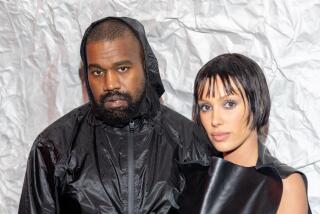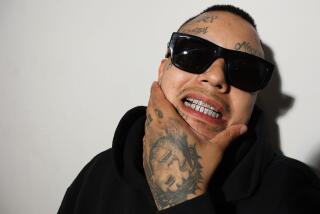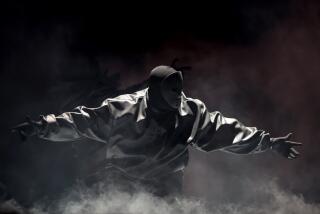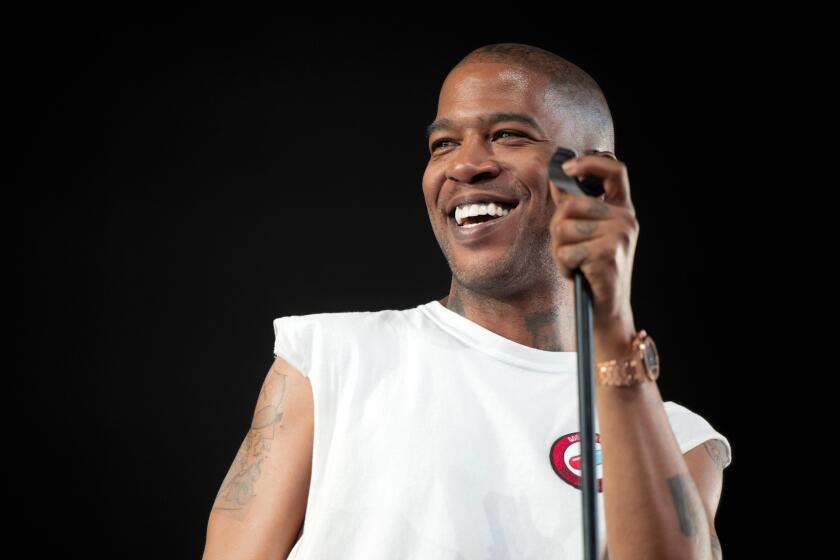America’s at a breaking point. So is YG
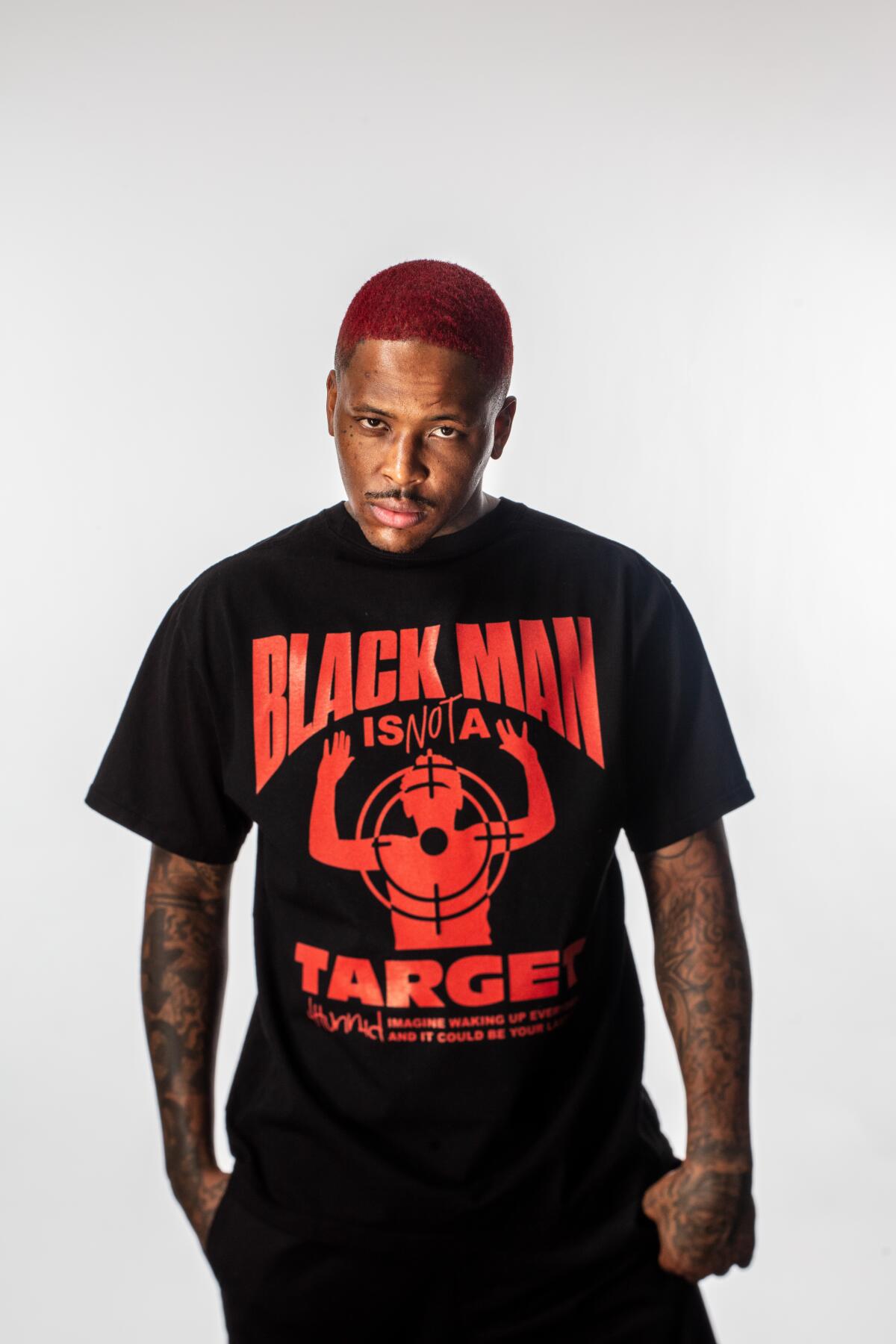
In the early hours of Jan. 24, the rapper YG was at home with his family in Chatsworth when L.A. County sheriff’s deputies banged on his door, guns out. The Compton-raised MC was scheduled to perform at the Grammys two days later for a tribute to his longtime friend, the late rapper Nipsey Hussle. The last thing he expected was deputies on his doorstep with a search warrant.
But a new dread set in once the sheriff’s deputies arrested and booked the 30-year-old in downtown L.A. on robbery charges and questioned him about a 2019 incident in which an SUV he owned was involved in a fatal shootout.
“They came for some s— that I don’t have no idea about,” YG, born Keenon Jackson, says on a recent day in the brand-new Burbank offices for his record label and fashion line. “But when they took me to Twin Towers, they had the homicide people come talk to me about some whole other situation. Right then, I’m not thinking about the Grammys. I’m thinking, ‘You finished, you ain’t going home.’ They were trying to spook me, hoping to put me away for life.”
Hours later, YG made bail and went on to perform a stirring verse at the Grammys alongside John Legend, Meek Mill, DJ Khaled and Roddy Ricch. L.A. County court records show Jackson pleaded not guilty in the 2019 case, which is pending. At the time, YG put out a tweet saying he was in a recording studio, not the SUV, when the incident occurred. A separate 2018 robbery charge in Las Vegas is still awaiting a court date. (YG’s lawyer Joe Tacopina did not return requests for comment.)
Even more than concern for his own future, YG worries for his young daughters, who saw their dad dragged off in handcuffs at gunpoint.
You can hear his daughter Harmony’s version of that day on an interlude on YG’s forthcoming album, “My Life 4Hunnid,” where in a heartbreakingly childish cadence she recalls the cops pulling weapons on her dad, just before his single “Out on Bail” begins.
He played Harmony’s snippet for a reporter just a few weeks after the same Sheriff’s Department shot and killed Dijon Kizzee after he was stopped for riding in the wrong direction on his bike, sparking widespread protests. YG knows his own arrest could have gone very wrong too.
“Kids get traumatized, waking up to guns in their faces,” YG says. “But this really happens. I wanted to bring people back into that time.”
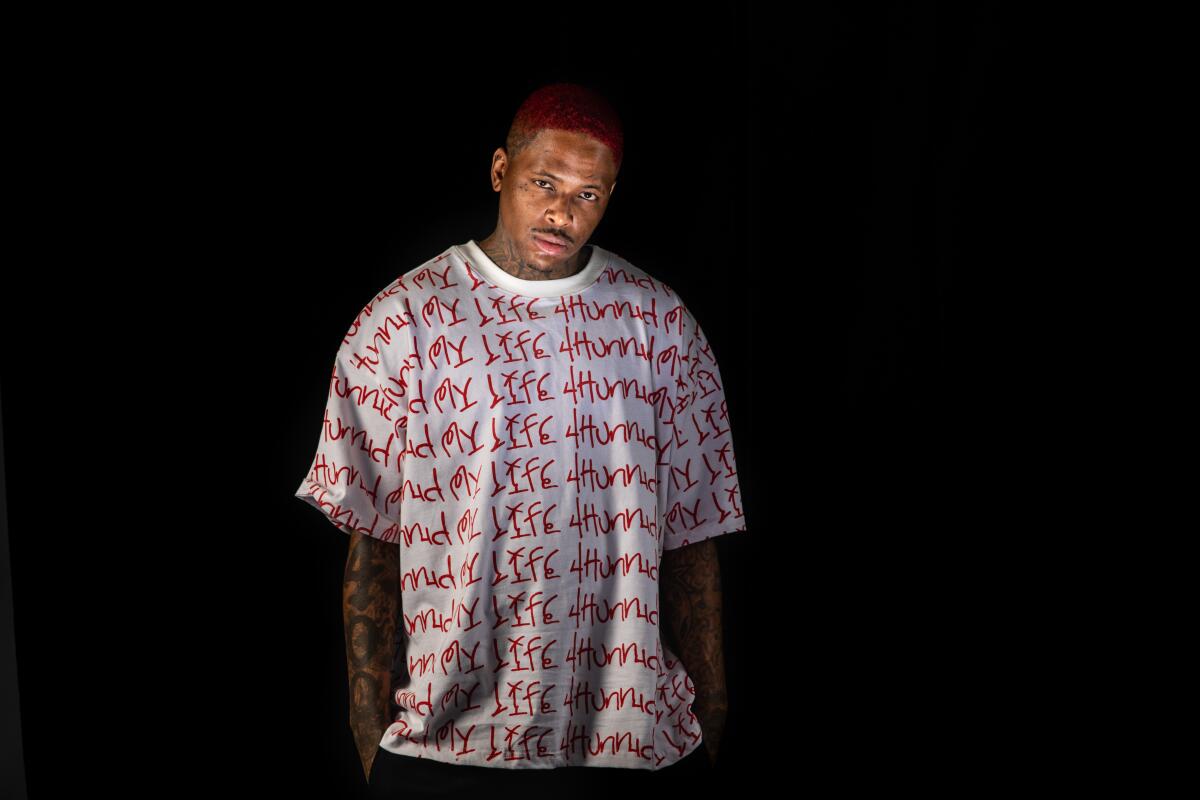
In his music, YG speaks to the immediate, hour-to-hour rage and vulnerability of Black life as protests churn and police kill and terrorize with seeming impunity. It’s fitting that “My Life 4Hunnid” is his darkest and most wounded album for Def Jam yet, one where the memories of his murdered friend Hussle and fears of rampaging police are stalked by worries that, on the eve of the 2020 election, the country might not have what it takes to fix it all.
After protests sparked by George Floyd’s May 25 killing by Minneapolis police consumed the streets of cities around the world, YG in June quickly released a scathing new single, “FTP,” a natural sequel to his track with Hussle “FDT.” Both tracks hold President Trump and the police in witheringly low regard.
But while “FDT” was a warning shot turned furiously prescient, “FTP” drew from a lineage of SoCal protest rap from N.W.A to the Black Lives Matter era. “Been tired, f— cardboard signs, we in the field / It’s the Ku Klux cops, they on a mission,” he raps. “Open cases, police already hate me … Oh they mad, f— it, let’s make ‘em mad.”
For the song’s video, YG performed at a protest that drew tens of thousands to Hollywood Boulevard, flanked by local activists Patrisse Cullors, Melina Abdullah and Kendrick Sampson. He’d pulled the plug on a previous spontaneous appearance days before, fearing police intervention and fans’ safety. But this time, the video shoot was a document of a moment in L.A. resistance, one that he knows will need fuel and resilience to keep moving.
“Because he was out on bail, I didn’t want police to mess with him when he was doing something so positive,” says Jen McDaniels, YG’s manager at SB Projects, Scooter Braun’s firm. “We called [Black Lives Matter co-founder] Patrisse Cullors and said he wants to do a protest, and during that shoot footage for the ‘FTP’ video, because he wants to stand with the community. Patrisse is a huge fan, and they proceeded to lock down streets, get an altar for the victims and a truck to perform on.” The turnout, she says, “showed how much his voice matters and how much his community needed that.”
“I just felt like I was doing something that I was supposed to do,” YG says. “The streets is talking, it’s things going on, it’s people you’ve killed. I represent the streets. So I’ve got to be a part of it, you know?”
Some protesters and observers grumbled about YG shooting a major-label video during an outpouring of a resistance movement, but he held to his convictions. “For anyone out there talking I don’t question your advocacy and don’t think you should question mine,” he wrote on Instagram and Twitter at the time. “See you gotta understand that a lot of people out there they see me as a N. They don’t see the Black proud man. They see a kid from Bompton and they expect violence. They hear FTP and they think I’m gonna come and burn my city. So we showed up and did it right. We proved them wrong.”
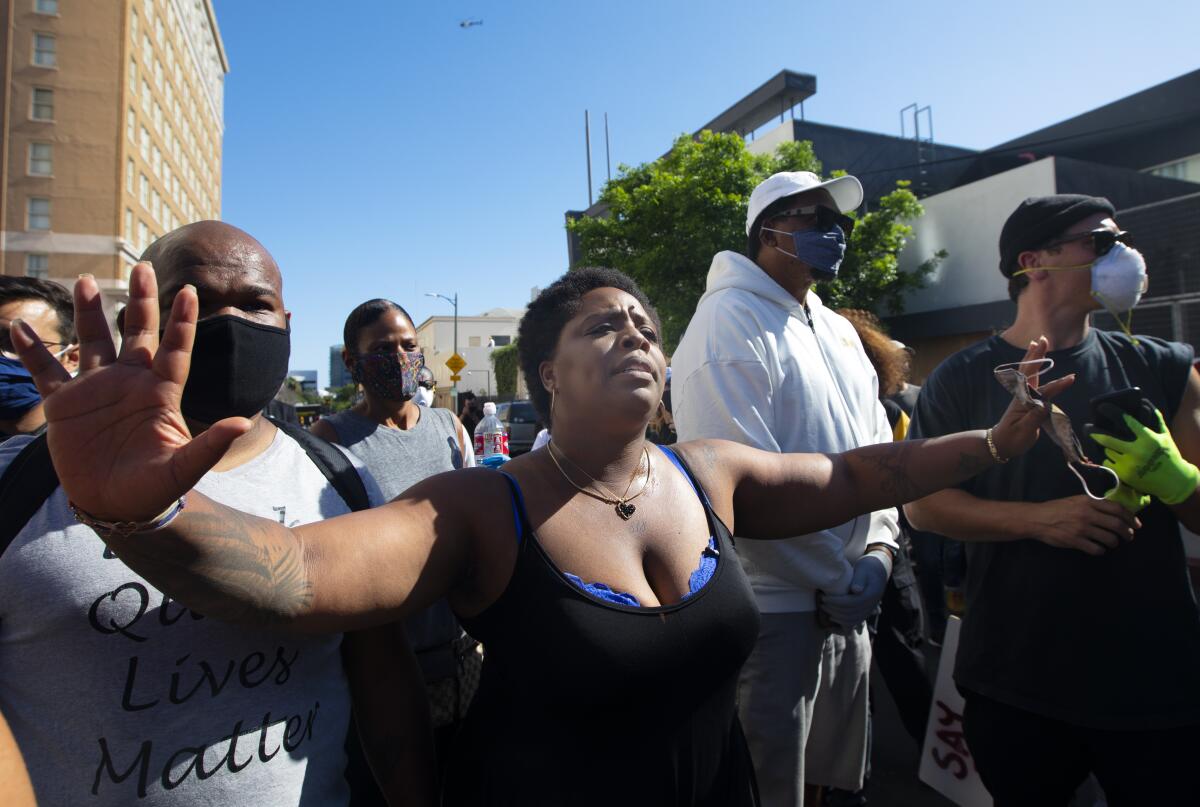
“FTP” is a second-half centerpiece of “My Life 4Hunnid,” and given YG’s prowess at booming club hits like “Go Loko” and ‘Big Bank,” he could have easily made a full LP of songs designed to keep bodies in the streets, both celebrating and seething. His 2020 performance of “Fight the Power” with Public Enemy at the BET Awards showed his place in that lineage.
But beyond “FTP,” the tracks on “4Hunnid” represent something new in his catalog — a slower, darker and even gentler album about the toll all that death enacts on the living.
“Beefing with my homies, all I think about is Nipsey,” he raps on “Out On Bail.” “Usually sip tequila but today I’m off that Henny / Thinking ‘bout Nipsey, yeah I had to get tipsy.”
On “Thugs Cry,” he raps about the paranoia and alienation that come from knowing cops are hanging on any reason to put him away. “They try to connect the dots, but it don’t connect, like pinstripes,” he raps. “When you call my phone, when you know it’s tapped, that’s an indict.”
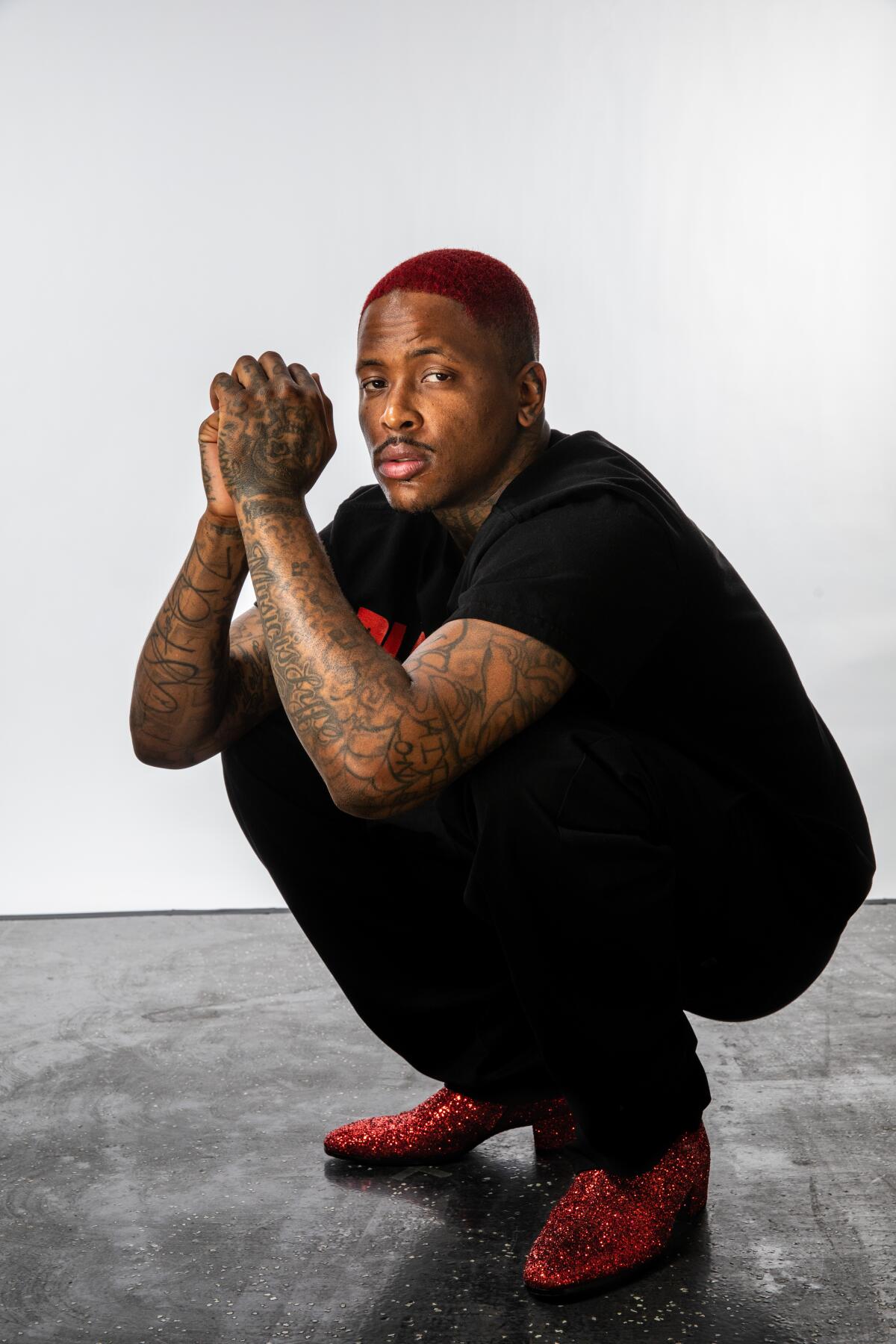
“Blood Walk,” “Rodeo” and “Laugh Now Kry Later” hold the flame for his club-ready instincts. But much of the music here, rather than his typical thick-curved basslines and gothic-funk synths, is strung with lonely guitar lines and fogged with vocal reverb on “Hate” and “War Scars.”
“I can’t come with my regulars, turnt up and lit,” he says, of making music to match the country’s mood. “I had to go tap into that. I’m so used to being like ‘I don’t give a f— , f— you, boom bam.’ Now I’m like, ‘Damn, I’ve got to really go get into some emo s—.”
He’s ready to put one very emotional topic to rest, however. Just weeks after Hussle’s slaying, YG turned much of his 2019 Coachella set into a pained but affirming tribute. The rapper didn’t talk much about their friendship in interviews at the time. “Nipsey is gone and it’s… sad. But at the end of the day, the homie would want me to keep the marathon going,” he told The Times last year. His Grammys set — the one preceded by his arrest — seemed to say all he couldn’t.
He’s still a little reticent to talk about the loss, but now for different reasons. “I want to let the homie rest,” he says. “I’m not gonna fall back and just talk about bro in interviews. Not just in breath, but on my records.” “My Life 4Hunnid” is, in part, a record about making a life in the wake of that loss.
But it’s also about preparing for the fights to come. YG says that, as “FDT” began circulating before the 2016 election, he and Def Jam’s parent company Universal Music Group got a letter from the FBI in regards to its lyrics: “You build walls, we gonna probably dig holes / And if your ass do win, you’re gonna probably get smoked.”
“I asked Nip, ‘You sure you want to put this out?’” YG says. “He was like, ‘We already get backlash. We already can’t do this and this and this. So f— it, let’s make it worth something.”
YG’s also been getting involved in local races, including the movement to oust L.A. County Dist. Atty. Jackie Lacey. “We gotta vote these [politicians] out of office, the ones controlling the inner city and the laws,” he says. “Those are the votes that really matter.”
But like everyone else, he’s on tenterhooks waiting for election night.
While he co-wrote the song that soundtracked the despair and confusion so many felt after Nov. 8 four years ago, he has no idea how this even more volatile election might pan out. A day after he spoke to The Times, news broke about the death of Supreme Court Justice Ruth Bader Ginsburg, and it was clear that all the voting and street protests in the world might not be enough to overcome the forces that put Trump into office in the first place.
But even in the event that Biden wins resoundingly, YG knows there will still be cops ready to make an example out of young Black men like him. And as long as he’s free, he’ll be ready to say so, on record.
“[Black people] were getting killed by the police before Trump, after Trump,” he says. “All the s— that matters to me in life is gonna happen regardless of who the person is. That’s just how it is in America.”
More to Read
The biggest entertainment stories
Get our big stories about Hollywood, film, television, music, arts, culture and more right in your inbox as soon as they publish.
You may occasionally receive promotional content from the Los Angeles Times.
